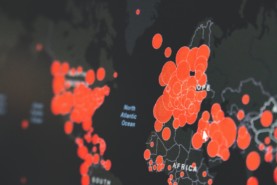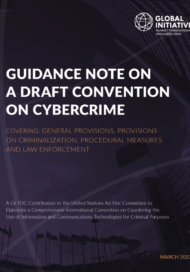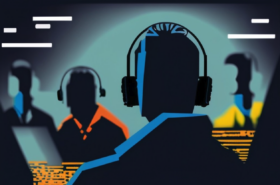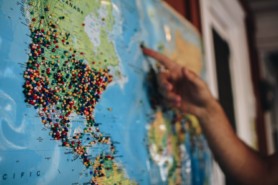The COVID-19 virus presents extraordinary challenges to the global community and to global governance. Not least of these is the degree to which organized crime may use the openings created by the political and social crises that the virus is bringing about to expand its impact, and build its legitimacy and reach with communities and governments alike.
This cynical opportunism in times of crisis is by no means unprecedented – mafia groups have long used the aftermath of humanitarian emergencies to strengthen their ties in communities and to leverage national governments for greater influence. The Yakuza gangs have been renowned first responders during earthquakes and tsunamis in Japan; the Jalisco cartel distributed aid to hurricane victims in western Mexico last year; meanwhile, al-Shabaab provides relief and distributes food assistance during Somalia’s cyclical droughts.
The literature on resilience, which spans people’s responses to a range of phenomena, from natural disasters and food insecurity to conflict settings, makes a clear distinction between shocks and stressors. Stressors are long-term, chronic strains, which progressively erode the viability, productivity and life chances of people. Violence and criminal governance are good examples of stressors. But the current pandemic, and the social distancing that has ensued, is a shock – an abrupt, unexpected and acute event, and evidence shows that shocks can fundamentally change existing paradigms.
While health officials work to stem the virus and deal with public-health policy, those of us engaged in discussions around governance and the rule of law need to think forward about social policy and how to change local governance paradigms. How can we mitigate the negative impacts of the COVID-19 shock, and perhaps even turn it into a positive?
In the local governance space, there are three categories of actors operating interdependently. These are, firstly, the state, its institutions and local authorities; secondly, there is civil society, whose work is often targeted at the most vulnerable, and designed to maintain and facilitate public discourse; and, thirdly, local-strongmen and challengers to legitimate authority, often in the form of organized crime. In places where state institutions are strong, the latter category is kept under control and distant from people’s everyday lives, though never entirely absent. In weak states, where state authority and service delivery is limited, there are fewer barriers and greater opportunities for criminal strongmen to assert themselves. Each of these actors works to address the service-delivery failures and shortcomings of the others. In so doing, their motive is to build societal legitimacy in their own way.
In cases where the state cannot ensure security, criminal and vigilante groups step into the void and provide ‘protection’. Where people cannot legitimately make a livelihood, or access loans, credit or financial systems, they turn to loansharks, theft, prostitution, drug dealing and other forms of crime. As shops empty, or as states bar people from accessing certain licit and illicit commodities, those needs will be met through the black market and the dark web. Organized criminal entities use benign messaging and much the same methodologies as civil society to reach out to communities, but while their outreach methods may be similar, their objectives are far more sinister.
The COVID-19 crisis is creating a shock to society by increasing people’s
needs. This is overwhelmingly the result of an externally introduced health danger,
it is not (at least not yet) the result of state failure. So, at this time
of expanded community needs, it is critically important that whatever steps in
to fill that space is not organized crime.
What if the virus constitutes such a fundamental shock to the system of governance that it causes new forms of legitimate governance to emerge? What if it actually serves to build social capital and trust, and in doing so closes down the space for criminal groups to flourish? If that is to be brought about, it means investing now not only to meet the current challenges, but also to create an alternative reality of legitimate governance in places where criminal gangs now hold sway.
In face of the lockdown, there is evidence of impressive and important
social organization on the part of civil-society groups and communities
rallying to help their neighbours. We see this in the programmes that the
GI-TOC Resilience Fund supports across the globe. One of our grantees, whose
work usually involves providing support to children vulnerable to gang
recruitment in a high-violence area has moved towards delivering food parcels
and doing community outreach. Our grantee explains:
‘In troubled times, it is sometimes difficult to
give to others, because we may feel trapped in our own situations. For that
reason, we made the decision yesterday that the time to put our money where our
mouths are is now. Despite the virus limiting and infiltrating our lives, we
will not stop doing our care work. Through laughter and play,
relationships are built. Strong bonds that cause people to feel cared for, relationships
in which people make time for one another, are important. And people who live
in the security of safe relationships grow and learn faster. Therefore, our
focus is on the family as a community at home.’
In these very dark hours, in response to a potent, disruptive shock, communities need to forge closer bonds to make them stronger and more resilient. This may be achieved on social media and through WhatsApp groups, rather than in real community gatherings, through expressions of solidarity and communicating around common challenges. But the impact is the same, and it is hugely important in the collective fight against organized crime.
Empirical studies have shown that by improving community organization – defined as ‘the density of interpersonal ties and the prevalence of shared expectation for collective action’ – communities directly limit the ability of organized-crime groups to control territory, reduce the benefits of coercive violence and generate pressure to protect residents from exploitation.
From the GI-TOC’s experience in engaging with communities at local level in places where criminal governance is high, the virus constitutes an opportunity to roll back criminal governance. To help achieve this, there are three do’s and one don’t:
DO:
✅ Use this opportunity to invest in and reinforce government responses that have legitimacy. Service delivery is best administered through state actors where possible and practicable. If these services involve police or military deployments on a short-term basis, then every effort needs to be made to ensure that their interventions are conducted with the utmost probity.
✅ Play a role in helping reinforce state legitimacy. Unfortunately, there have been reports of state institutions overstepping their mark, and of individual officials abusing their power. But it is early days, and astute leaders must work to urgently reverse such occurrences. This is a fundamental time to build state legitimacy and respect for the rule of law, so every act of aggression by a state actor, such as a police officer or member of the military, is symbolic of state failure.
✅ Invest heavily in local civil society. Reinforce the creation of new voices and new leadership in damaged communities. Even without a more focused effort, a stronger civil society will incrementally close down the space for criminal governance and illicit opportunism. Where possible, also use the opportunity to build social solidarity against organized-crime groups and the illicit economy. While they suffer from the shock the virus has created, communities will be more sensitive to the harms the illicit economy has caused. Don’t allow people’s vulnerability and desperation make them turn to organized crime: provide alternatives where and when people will need it most.
DO NOT:
❌ Partner with criminal groups. Instead, isolate criminal figures and known traffickers. It should be said out loud that these are people who are widely known, but often untouchable. At a time when the political economy is shifting rapidly and substantially, urge governments not to join forces with criminals to enforce social policy, despite the reach of their local power.
Mirroring the global economy, the global illicit economy is now under
enormous strain, as we described in our recent policy brief. We are not so
naive as to think that this is by any means a death knell for organized crime,
but there is a significant opportunity now to reduce its impact. Levels of
global illicit flows and their impact locally have been progressively and
incrementally growing to the point where their burden was placing an
intolerable burden on human development. The virus is a dramatic and catalytic
event that draws attention to the attrition to organized crime, but both are equally
insidious for long-term prosperity.
Ultimately, the solutions
to both the problem of the virus and organized crime are surprisingly similar: they
involve building national and community solidarity against global damage while recognizing
global good.
COVID-19: Fortalecer la sociedad civil en un momento de cambios sin precedentes y socavar la gobernanza criminal
El virus COVID-19 presenta desafíos extraordinarios para la comunidad global y su gobernanza. No menos importante es el hecho de que el crimen organizado puede usar las aperturas creadas por las crisis políticas y sociales que el virus está provocando, para expandir su impacto, construir su legitimidad y trastocar a comunidades y gobiernos por igual.
Este oportunismo cínico en tiempos de crisis no es una novedad. Los grupos de la mafia italiana han utilizado durante mucho tiempo las secuelas de las emergencias humanitarias para fortalecer sus lazos en las comunidades y así aprovecharse de los gobiernos nacionales para adquirir mayor influencia. Las pandillas de Yakuza han sido de los primeros en responder durante terremotos y tsunamis en Japón. El Cartel Jalisco Nueva Generación distribuyó ayuda a las víctimas de huracanes en el oeste de México el año pasado. Mientras tanto, al-Shabaab brinda ayuda y distribuye asistencia alimentaria durante las sequías cíclicas de Somalia.
La literatura sobre resiliencia, que abarca las respuestas de las personas a una variedad de fenómenos, -desde desastres naturales e inseguridad alimentaria, hasta situaciones de conflicto-, hace una clara distinción entre los factores estresantes y choques. Los factores estresantes son tensiones crónicas a largo plazo, que erosionan progresivamente la viabilidad, la productividad y las oportunidades de la vida de las personas. La violencia y la gobernanza criminal son buenos ejemplos. Pero la pandemia actual, con todo y las medidas de distanciamiento social, es un choque: un evento abrupto, inesperado y agudo. Y la evidencia muestra que los choques pueden cambiar fundamentalmente los paradigmas existentes.
Mientras los funcionarios públicos del sector salud trabajan para detener el virus y abordar la política de salud pública, somos nosotros, quienes participamos en debates sobre la gobernanza y el estado de derecho, los que debemos pensar con anticipación sobre la política social y cómo cambiar los paradigmas de gobernanza local. ¿Cómo podemos mitigar los impactos negativos del choque COVID-19 y tal vez incluso convertirlos en algo positivo?
En el espacio de gobernanza local, hay tres categorías de actores que operan de manera interdependiente. Tenemos en primer lugar al estado, con sus instituciones y autoridades locales. Otra categoría la constituye la sociedad civil, cuyo trabajo a menudo está dirigido a los más vulnerables y está diseñado para mantener y facilitar el discurso público. Y finalmente están los liderazgos individuales a nivel local que tienen la capacidad de retar a la autoridad legitima, capacidad que a menudo se manifiesta en formas de crimen organizado. En lugares donde las instituciones gubernamentales son fuertes, la última categoría se mantiene bajo control y distante de la vida cotidiana de las personas, aunque nunca está completamente ausente. En los estados débiles, donde la autoridad estatal y la prestación de servicios son limitados, hay menos barreras y mayores oportunidades para que se impongan aquellos quienes desafían a la autoridad legítima. Cada uno de estos actores trabaja para abordar las fallas en la prestación de servicios y las deficiencias de los demás. Al hacerlo, su motivo es construir legitimidad social a su manera.
En los casos en que el estado no puede garantizar la seguridad, los grupos criminales y vigilantes llenan el vacío y brindan “protección”. Cuando las personas no pueden ganarse la vida legítimamente ni acceder a préstamos, créditos o sistemas financieros, recurren con mayor frecuencia a los prestamistas, el robo, la prostitución, el tráfico de drogas y otras formas de delincuencia. A medida que las tiendas se vacíen o que los estados prohíban a las personas acceder a ciertos productos, lícitos e ilícitos, esas necesidades serán satisfechas en el mercado negro y la llamada dark web, o web oscura. Las entidades delictivas organizadas utilizan mensajes benignos y los mismas métodos que la sociedad civil para llegar a las comunidades; pero mientras sus métodos de divulgación pueden ser similares, sus objetivos son mucho más siniestros.
La crisis del COVID-19 está creando un choque en la sociedad al aumentar las necesidades de las personas. Esto es abrumadoramente el resultado de una amenaza para la salud publica de carácter externo que no es (al menos todavía) el resultado de una falla estatal. En este momento de expansión de las necesidades de la comunidad, es de vital importancia que cualquier cosa que intervenga para llenar ese espacio, no sea crimen organizado.
¿Qué pasa si el virus constituye un choque tan fundamental para el sistema de gobierno que hace surgir nuevas formas de gobierno legítimo? ¿Qué pasa si en realidad sirve para construir capital social y confianza, y al hacerlo cierra el espacio a los grupos criminales? Para que eso suceda, habría que invertir ahora no solo en enfrentar los desafíos inmediatos, sino también en crear una realidad alternativa de gobierno legítimo en lugares donde las pandillas criminales ahora dominan.
Hay evidencia ya de una importante e impresionante organización y coordinación por parte de grupos de la sociedad civil y otras comunidades que se unen para ayudar a sus vecinos durante los bloqueos y cierres de emergencia. Esto lo vemos reflejado en los programas que el Fondo Resiliencia de GI-TOC apoya en todo el mundo. Uno de nuestros beneficiarios, cuyo trabajo generalmente implica brindar apoyo a los niños vulnerables al reclutamiento de pandillas en un área de alta violencia, se ha movido hacia la entrega de paquetes de alimentos a familias y la divulgación comunitaria. Nuestro socio explica:
“En tiempos difíciles, a veces es difícil dar a los demás, porque podemos sentirnos atrapados en nuestras propias situaciones. Por esa razón, ayer tomamos la decisión de que hoy más que nunca es momento de hacer honor a nuestros compromisos. A pesar de que el virus infiltra y limita nuestras vidas, nosotros no dejaremos de hacer nuestro trabajo. A través de la risa y el juego se construyen relaciones. Los lazos fuertes que hacen que las personas se sientan atendidas, las relaciones en las que las personas se dedican tiempo unos a otros, hoy son más importantes. Y las personas que viven en la seguridad de las relaciones seguras crecen seguras y aprenden más rápido. Por lo tanto, nuestro enfoque está en la familia como comunidad en el hogar “.
En estas horas tan oscuras, ante un choque disruptivo tan potente, las comunidades necesitan forjar vínculos más estrechos para hacerse más fuertes y resilientes. En lugar de reuniones comunitarias reales, esto se puede lograr en las redes sociales y a través de los grupos de WhatsApp, a través de expresiones de solidaridad y compartiendo experiencias sobre los desafíos comunes. El impacto de estas interacciones virtuales puede ser el mismo, y es de gran importancia en la lucha colectiva contra el crimen organizado.
Los estudios empíricos que definen la organización comunitaria como “la densidad de los lazos interpersonales y la prevalencia de la expectativa compartida de acción colectiva” ya han demostrado sus beneficios. La evidencia muestra que las comunidades bien organizadas pueden limitar directamente la capacidad de los grupos del crimen organizado para controlar el territorio, reduciendo los beneficios de la violencia coercitiva, y generar así presión para proteger de explotación a sus residentes.
Según la experiencia de GI-TOC construyendo relaciones con las comunidades locales en lugares con altos niveles de gobernanza criminal, el virus constituye una oportunidad para disminuir estos nieveles. Para ayudar a lograr esto, proponemos tres cosas para HACER y una para NO hacer:
HACER:
✅ Aprovechar esta oportunidad para invertir y reforzar las respuestas del gobierno que tienen legitimidad. La prestación de servicios se administra mejor a través de actores estatales siempre que sea posible y factible. Si estos servicios involucran despliegues policiales o militares a corto plazo, entonces se debe hacer todo lo posible para garantizar que sus intervenciones se realicen con la mayor probidad.
✅ Desempeñar un papel para ayudar a reforzar la legitimidad del estado. Desafortunadamente, ha habido informes de instituciones estatales cometiendo abusos y de funcionarios individuales abusando de su poder. Pero aún estamos al inicio, y los líderes astutos deben trabajar para revertir con urgencia tales hechos. Este es un momento fundamental para construir la legitimidad del estado y el respeto del estado de derecho. Cada acto de agresión por parte de un actor estatal, como un oficial de policía o un miembro del ejército, simboliza el fracaso del estado.
✅ Invertir en la sociedad civil local. Reforzar la creación de nuevas voces y nuevos liderazgos en comunidades afectadas. Incluso sin esfuerzos muy enfocados, una sociedad civil más fuerte, irá cerrando gradualmente el espacio para la gobernanza criminal y el oportunismo de los mercados ilícitos. Siempre que sea posible, hay que aprovechar también la oportunidad para fomentar la solidaridad social contra los grupos del crimen organizado y las economías ilícitas. Mientras sufren el choque que ha creado el virus, las comunidades serán más sensibles a los daños que estos han causado. No permitamos que la vulnerabilidad y la desesperación de las personas les hagan recurrir al crimen organizado. Hay que proporcionar alternativas donde y cuando las personas más lo necesiten.
NO HACER
❌ Asociarse con grupos criminales. En cambio, hay que aislarse de las figuras criminales y traficantes conocidos. Hay que decir que estas son personas ampliamente conocidas, pero a menudo intocables. En un momento en que la economía política está cambiando rápida y sustancialmente, hay instar a los gobiernos a no unir fuerzas con los delincuentes para hacer cumplir la política social, a pesar de los beneficios que estos pudieran ofrecer por su poder local.
Como describimos en nuestro reciente informe de política pública y COVID-19, al igual que la economía global, la economía ilícita mundial está ahora bajo una enorme presión. No somos tan ingenuos como para pensar que el virus representa una sentencia de muerte para el crimen organizado, pero ahora hay una oportunidad significativa para reducir su impacto. Los niveles de los flujos ilícitos mundiales y su impacto local han ido creciendo progresiva e incrementalmente hasta el punto en que su carga se ha vuelto intolerable para el desarrollo humano. El virus es un evento dramático y catalítico que llama la atención sobre el desgaste del crimen organizado, pero ambos son igualmente insidiosos para la prosperidad a largo plazo. En última instancia, las soluciones tanto para el problema del virus como para el crimen organizado son sorprendentemente similares: implican la construcción de la solidaridad nacional y comunitaria contra el daño a nivel mundial, al tiempo que se reconoce el bien global.



